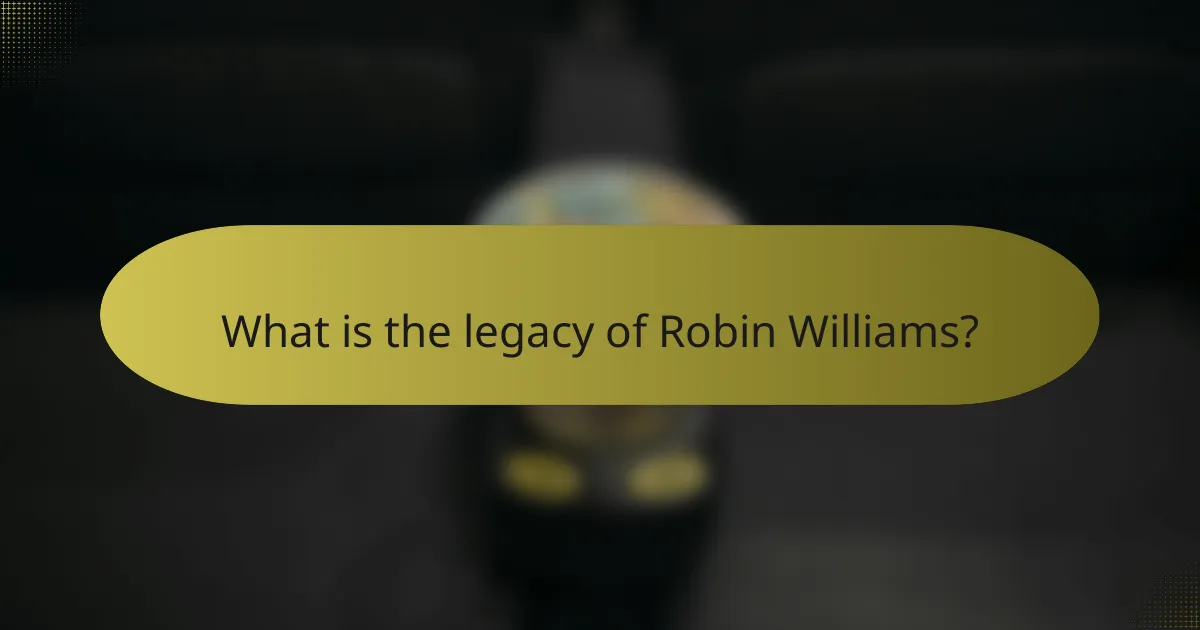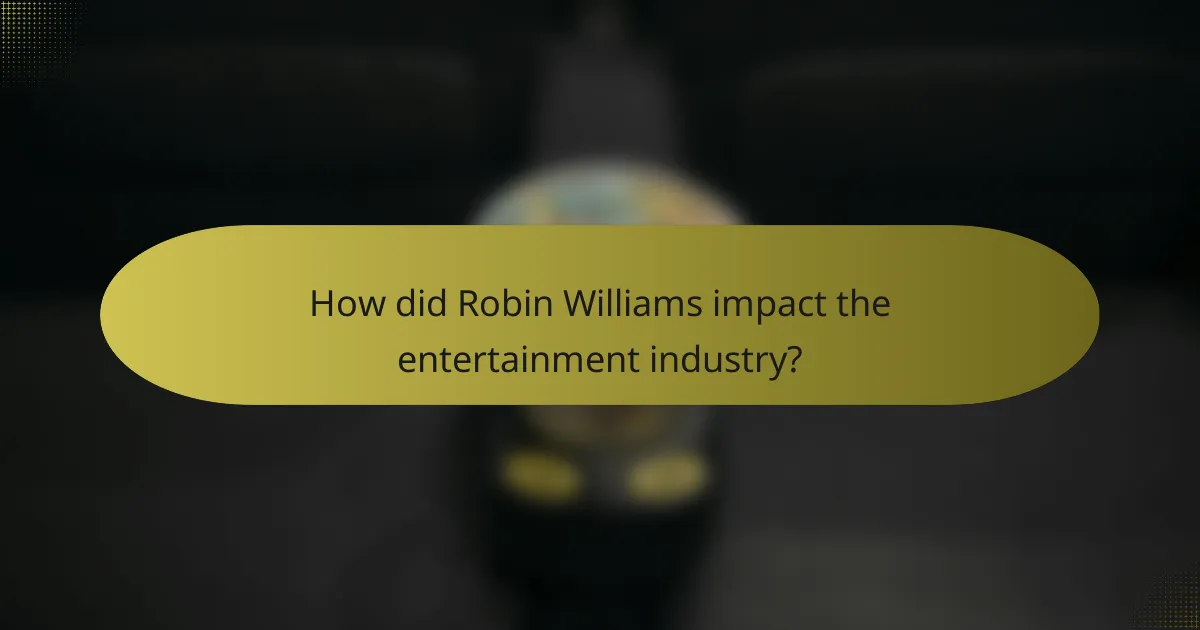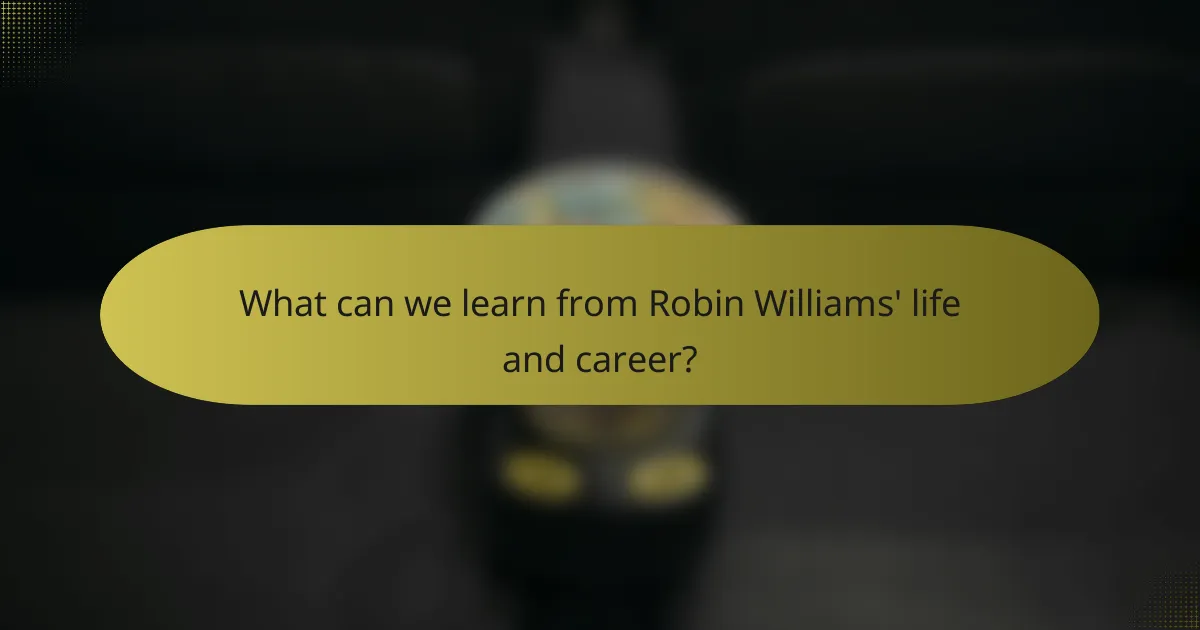Robin Williams was a renowned actor and comedian celebrated for his groundbreaking contributions to both comedy and film, as well as his advocacy for mental health. He transformed stand-up comedy with his improvisational style and high-energy performances, earning critical acclaim in films such as “Good Will Hunting,” for which he received an Academy Award for Best Supporting Actor. Williams’ ability to intertwine humor with profound emotional depth distinguished him in dramatic roles, and his open discussions about his struggles with mental health issues have significantly raised awareness. Following his passing in 2014, the Robin Williams Foundation was established to support mental health initiatives, underscoring his lasting influence on the industry and society. His legacy continues to inspire and affect generations of entertainers and advocates alike.

What is the legacy of Robin Williams?
Robin Williams’ legacy is defined by his immense contributions to comedy and film, as well as his advocacy for mental health. He revolutionized stand-up comedy with his improvisational style and energetic performances. Williams starred in iconic films such as “Good Will Hunting,” earning an Academy Award for Best Supporting Actor. His ability to blend humor with deep emotional resonance set him apart in dramatic roles. Beyond entertainment, Williams raised awareness about mental health issues, openly discussing his struggles with depression and anxiety. His passing in 2014 sparked conversations about mental health, leading to increased advocacy efforts. The Robin Williams Foundation was established to support mental health initiatives, further solidifying his impact. His work continues to inspire comedians and actors, influencing generations.
How did Robin Williams become a comedic genius?
Robin Williams became a comedic genius through his unique improvisational skills and energetic performances. He developed his craft in stand-up comedy, showcasing his ability to think quickly and connect with audiences. Williams often drew on personal experiences, blending humor with heartfelt storytelling. His roles in television and film further showcased his versatility and depth. Iconic performances in movies like “Good Morning, Vietnam” and “Mrs. Doubtfire” solidified his status. Williams won numerous awards, including an Academy Award for Best Supporting Actor. His impact on comedy continues to influence artists today.
What are the key elements of Robin Williams’ comedic style?
Robin Williams’ comedic style is characterized by his improvisational skills, energetic performances, and rapid-fire delivery. He often used stream-of-consciousness techniques, blending various topics seamlessly. His ability to switch personas and accents added depth to his characters. Williams frequently incorporated physical comedy, enhancing his humor through expressive body language. He addressed serious subjects with humor, creating a unique blend of comedy and poignancy. His performances showcased a deep understanding of human emotions, making his comedy relatable. His stand-up routines often featured personal anecdotes, drawing from his own life experiences. Williams’ comedic legacy includes his influence on both live performances and film, showcasing his versatility as a performer.
How did his background influence his comedy?
Robin Williams’ background significantly influenced his comedy. He grew up in a well-to-do family, which provided him access to diverse experiences. His father was a senior executive at Ford, exposing him to corporate culture. This environment fostered his early interest in performance and storytelling. Williams attended Juilliard, where he honed his improvisational skills. His experiences with family dynamics shaped his understanding of humor and tragedy. Additionally, his struggles with mental health informed his comedic style. He often used humor as a coping mechanism, reflecting his personal battles. This blend of privilege and struggle created a unique comedic voice that resonated widely.
What are some of Robin Williams’ most memorable dramatic roles?
Robin Williams’ most memorable dramatic roles include his performances in “Good Will Hunting,” “Dead Poets Society,” and “One Hour Photo.” In “Good Will Hunting,” Williams portrayed Sean Maguire, a therapist who helps a troubled genius. This role earned him an Academy Award for Best Supporting Actor. In “Dead Poets Society,” he played John Keating, an inspiring English teacher who encourages students to seize the day. This performance is iconic for its emotional depth. In “One Hour Photo,” Williams took on the role of Sy Parrish, a lonely photo technician, showcasing his ability to portray darker characters. Each of these roles highlights Williams’ range and commitment to dramatic storytelling.
What themes are prevalent in his dramatic performances?
Themes prevalent in Robin Williams’ dramatic performances include mental health, existential struggle, and the complexity of human relationships. His roles often explore the depths of despair and the quest for meaning. For instance, in “Good Will Hunting,” Williams portrays a therapist guiding a troubled genius. This film highlights the theme of healing through connection and understanding. In “Dead Poets Society,” the exploration of individuality versus conformity is central. Williams’ character inspires students to pursue their passions, emphasizing the importance of self-discovery. These themes reflect Williams’ own advocacy for mental health awareness. His performances resonate with audiences due to their emotional depth and authenticity.
How did his dramatic roles showcase his versatility as an actor?
Robin Williams’ dramatic roles showcased his versatility as an actor by highlighting his ability to portray a wide range of emotions. In films like “Dead Poets Society,” he played an inspiring teacher, demonstrating depth and sensitivity. His performance in “Good Will Hunting” revealed a compassionate therapist, showcasing his capacity for empathy. In “Awakenings,” he portrayed a neurologist, blending intellect with emotional resonance. These roles contrasted sharply with his comedic persona, proving his adaptability. Critics noted his seamless transitions between humor and drama, reinforcing his status as a multifaceted performer. His Academy Award win for “Good Will Hunting” further validated his dramatic prowess.
How did Robin Williams advocate for mental health awareness?
Robin Williams advocated for mental health awareness through his openness about his struggles. He openly discussed his battles with depression and anxiety in interviews. Williams used his platform to destigmatize mental health issues. He participated in various mental health initiatives and campaigns. His foundation, the Windfall Foundation, aimed to support mental health programs. Williams’ comedic performances often highlighted the importance of mental well-being. His untimely death in 2014 sparked conversations about mental health. This led to increased awareness and advocacy efforts in the community.
What initiatives did he support related to mental health?
Robin Williams supported several initiatives related to mental health. He was an advocate for mental health awareness and openly discussed his struggles with depression and anxiety. Williams participated in campaigns that aimed to reduce stigma associated with mental illness. He supported organizations like the National Alliance on Mental Illness (NAMI). Additionally, he contributed to mental health charities, promoting access to mental health resources. His efforts helped to raise public awareness about the importance of mental health care. Williams’ legacy continues to inspire conversations about mental health issues.
How did his personal struggles influence his advocacy?
Robin Williams’ personal struggles significantly influenced his advocacy for mental health. His battles with depression and anxiety shaped his understanding of mental illness. Williams openly discussed his own experiences, helping to destigmatize these issues. He used his platform to raise awareness about mental health challenges. This advocacy was evident in interviews and public appearances. His struggles made his message more relatable and authentic. Williams’ commitment to mental health was further reflected in his support for various organizations. His legacy continues to inspire conversations about mental health today.

How did Robin Williams impact the entertainment industry?
Robin Williams profoundly impacted the entertainment industry through his unique comedic style and versatile acting. He revolutionized stand-up comedy with improvisational techniques and rapid-fire delivery. His performances in films like “Good Will Hunting” and “Dead Poets Society” showcased his ability to convey deep emotion. Williams won an Academy Award for Best Supporting Actor for “Good Will Hunting.” He also received multiple Golden Globe Awards, highlighting his influence on both comedy and drama. His advocacy for mental health raised awareness within the industry. Williams’ legacy continues to inspire future generations of entertainers.
What contributions did he make to film and television?
Robin Williams made significant contributions to film and television through his unique comedic style and dramatic performances. He starred in iconic films such as “Good Will Hunting,” which earned him an Academy Award for Best Supporting Actor. His role in “Mrs. Doubtfire” showcased his ability to blend humor with heartfelt emotion. Williams also provided the voice for the beloved character Genie in Disney’s “Aladdin,” which became a cultural phenomenon.
On television, he gained fame with the sitcom “Mork & Mindy,” which introduced his improvisational skills to a wider audience. Williams was known for his ability to improvise, often enhancing scripts with spontaneous humor. His performances consistently highlighted themes of mental health and personal struggle, raising awareness on these important issues. Overall, his work in both mediums left a lasting impact on audiences and the entertainment industry.
How did his improvisational skills change comedic performances?
Robin Williams’ improvisational skills revolutionized comedic performances by introducing spontaneity and unpredictability. His ability to think on his feet allowed for unique interactions with audiences and fellow performers. This spontaneity often led to memorable moments that were not scripted. Williams’ improvisation created a dynamic atmosphere, engaging viewers in a way that traditional comedy often did not. His performances often included rapid-fire jokes and character changes, showcasing his versatility. The impact of his style can be seen in modern comedy, where improvisation is now a staple. Comedians today frequently cite Williams as an influence for their own improvisational techniques. His approach has changed the expectations of live performances, emphasizing the importance of audience connection.
What was his influence on future generations of comedians?
Robin Williams influenced future generations of comedians through his innovative style and emotional depth. His ability to blend humor with poignant moments set a new standard in comedy. Williams showcased the importance of vulnerability in performance. Many comedians cite him as a major inspiration for their own work. His improvisational skills encouraged others to embrace spontaneity. Williams’ unique approach to character-driven comedy opened doors for diverse comedic voices. He also highlighted mental health issues through his performances, paving the way for discussions in comedy. Overall, his legacy continues to inspire creativity and authenticity in comedy today.
Why is Robin Williams considered a cultural icon?
Robin Williams is considered a cultural icon due to his exceptional talent in acting and comedy. He gained fame for his unique improvisational style and ability to connect with audiences. His performances in films like “Good Will Hunting” and “Mrs. Doubtfire” showcased his versatility. Williams won an Academy Award for Best Supporting Actor in 1998, solidifying his status in Hollywood. He was also known for his advocacy on mental health issues, sharing his own struggles publicly. This openness helped destigmatize mental health conversations. His impact on both comedy and drama has left a lasting legacy in entertainment.
What are some of the awards and recognitions he received?
Robin Williams received numerous awards and recognitions throughout his career. He won two Academy Awards, one for Best Supporting Actor in “Good Will Hunting” and another for Best Actor in a Short Film. Williams was awarded four Golden Globe Awards for his performances in “Mork & Mindy,” “Good Morning, Vietnam,” “Mrs. Doubtfire,” and “The Fisher King.” He also received a Screen Actors Guild Award for Outstanding Performance by a Male Actor in a Leading Role for “Good Will Hunting.” Additionally, Williams was honored with the prestigious Mark Twain Prize for American Humor in 2009. These accolades highlight his significant impact on film and comedy.
How do his films continue to resonate with audiences today?
Robin Williams’ films continue to resonate with audiences today due to their timeless themes and emotional depth. His ability to blend humor with poignant moments creates a lasting impact. Films like “Good Will Hunting” address mental health, fostering conversations that remain relevant. The relatability of his characters allows viewers to connect personally with their struggles and triumphs. Additionally, Williams’ unique comedic style brings joy, making his films comforting during difficult times. The cultural references within his work also maintain relevance in contemporary society. Overall, his legacy endures as audiences appreciate the blend of laughter and meaningful storytelling.

What can we learn from Robin Williams’ life and career?
Robin Williams’ life and career teach us the importance of authenticity and vulnerability. He was known for his unique blend of comedy and drama. Williams used humor to connect with audiences while addressing serious issues. His performances often showcased deep emotional range. He won multiple awards, including two Academy Awards, demonstrating his talent. Williams openly discussed his struggles with mental health. His advocacy raised awareness about mental illness. He emphasized the need for compassion and understanding in society.
How can we honor Robin Williams’ legacy today?
We can honor Robin Williams’ legacy today by promoting mental health awareness. Williams was a strong advocate for mental health issues. He openly discussed his struggles with depression and anxiety. Supporting mental health initiatives can continue his mission. Donations to mental health organizations can make a significant impact. Participating in events like Mental Health Awareness Month honors his advocacy. Additionally, sharing his films can inspire conversations about mental health. Celebrating his comedic and dramatic roles keeps his spirit alive. Engaging in community activities that promote joy and laughter reflects his essence.
What practices can we adopt to promote mental health awareness?
Promoting mental health awareness can be achieved through various practices. Educational programs in schools can teach students about mental health. Workshops for parents can help them understand mental health issues in children. Community events can raise awareness and reduce stigma. Social media campaigns can spread information quickly and effectively. Collaborations with local businesses can provide resources and support for mental health initiatives. Training for employees can create supportive workplaces. Advocacy efforts can influence policy changes for better mental health services. These practices collectively enhance understanding and awareness of mental health.
How can we celebrate creativity and humor in our lives?
We can celebrate creativity and humor in our lives by engaging in activities that inspire joy and imagination. Participating in arts and crafts fosters creativity. Attending comedy shows or watching funny films can enhance our sense of humor. Sharing jokes or funny stories with friends promotes laughter. Exploring new hobbies allows for personal expression and creativity. Joining workshops or classes can improve creative skills. Volunteering for community art projects encourages collaboration and humor. Celebrating creativity and humor contributes to mental well-being. Studies show that laughter reduces stress and improves mood. Engaging in these activities helps us appreciate the lighter side of life.
What resources are available for those inspired by his advocacy?
Resources available for those inspired by Robin Williams’ advocacy include mental health organizations and support groups. The National Alliance on Mental Illness (NAMI) offers educational resources and support networks. The Substance Abuse and Mental Health Services Administration (SAMHSA) provides a national helpline for immediate assistance. Mental Health America (MHA) has tools for self-help and community engagement. Additionally, the American Foundation for Suicide Prevention (AFSP) promotes awareness and prevention strategies. These organizations reflect Williams’ commitment to mental health awareness and provide avenues for support and education.
How can individuals get involved in mental health initiatives?
Individuals can get involved in mental health initiatives by volunteering with organizations focused on mental health. Many nonprofits seek support for events, outreach, and educational programs. Individuals can also participate in fundraising activities to raise awareness and funds for mental health causes. Joining local support groups can provide community engagement and share personal experiences. Advocating for mental health policy changes is another impactful way to contribute. Engaging in conversations about mental health helps reduce stigma and promotes awareness. Research indicates that community involvement significantly enhances mental health outcomes (Mental Health America, 2021).
What are some recommended films and performances to explore his work?
Some recommended films and performances to explore Robin Williams’ work include “Good Will Hunting,” where he won an Academy Award for Best Supporting Actor. “Dead Poets Society” showcases his inspirational role as an English teacher. “Mrs. Doubtfire” highlights his comedic talent in a family-friendly context. “Aladdin” features his iconic voice performance as the Genie. “One Hour Photo” presents a darker, dramatic side of his acting range. “The Fisher King” combines comedy and drama, earning him critical acclaim. Each of these works illustrates his versatility and depth as an actor.
The main entity of the article is Robin Williams, a renowned actor and comedian celebrated for his significant contributions to comedy, film, and mental health advocacy. The article explores Williams’ legacy, highlighting his revolutionary improvisational comedy, memorable dramatic roles, and his commitment to raising awareness about mental health issues. It details his unique comedic style, the influence of his background on his work, and the themes prevalent in his performances. Additionally, the article discusses his advocacy efforts, the impact of his personal struggles on his mental health initiatives, and the resources available for those inspired by his legacy.